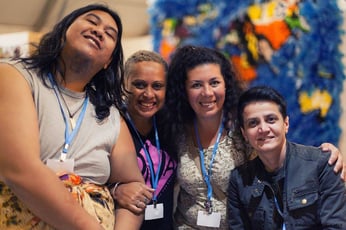Resources

Support Our Work
Your donation provides us with the stable foundation we need to build the feminist future we’re working to realize.
Donate TodayCate Owren Coordinates WEDO’s Sustainable Development Program Copenhagen, December 15–A quick update on where we – WEDO and Global Gender and Climate Change Alliance (GGCA) gender advocates – are right now in the Long-term Collaborative Actions (LCA) negotiations… It’s been a long and exhausting nine days, and we haven’t stopped running for a minute! The […]
Cate Owren Coordinates WEDO’s Sustainable Development Program
Copenhagen, December 15–A quick update on where we – WEDO and Global Gender and Climate Change Alliance (GGCA) gender advocates – are right now in the Long-term Collaborative Actions (LCA) negotiations…
It’s been a long and exhausting nine days, and we haven’t stopped running for a minute! The team here is amazing – from Ghana and Togo, Nepal and India, Costa Rica and Brazil, Australia, the Pacific Islands, the U.S and beyond… As those who have been following our work know, we’ve been engaged very specifically with Parties on identifying and crafting effective entry-points for gender in the climate change negotiations this year. In the first full drafting round, over 40 references to women and gender issues made it into the “focus document” at the start of negotiations; then the references dropped to 30+, then 23, then 8, then 3.
But here we are: it’s Tuesday the 15th of December, and the high-level segment opens this evening. Right now, we have text in three major areas of negotiations – Adaptation, Capacity-building, and Reducing Emissions from Deforestation and Forest Degradation in Developing Countries (REDD) – as well as two strong preamble paragraphs which we are working hard to retain.
“Mindful that the adverse effects of climate change have a range of direct and indirect implications for the full enjoyment of human rights, including the right to live well, and that the effects of climate change will be felt most acutely by those parts of the population that are already vulnerable owing to youth, gender, age or disability,
Further recognizing that a broad range of stakeholders needs to be engaged on global, regional, national and local levels, be they governmental, including sub-national and local government, private business or civil society, including the youth and persons with disability, and that gender equality and the effective participation of women”
Governments like Iceland, Finland, Ghana and Gambia, as well as negotiating groups like The Least Developed Countries and the African Group have been year-long champions of gender equality issues. New allies are pushing the text further – and although the most critical days are ahead of us, it’s already been a monumental, history-making year. With a little luck, a lot more walking of the halls, and hopefully a few more hours of sleep to push again tomorrow, we just might leave Copenhagen with an outcome that is, in fact, effective for the world’s women and men.
Resources

Support Our Work
Your donation provides us with the stable foundation we need to build the feminist future we’re working to realize.
Donate Today